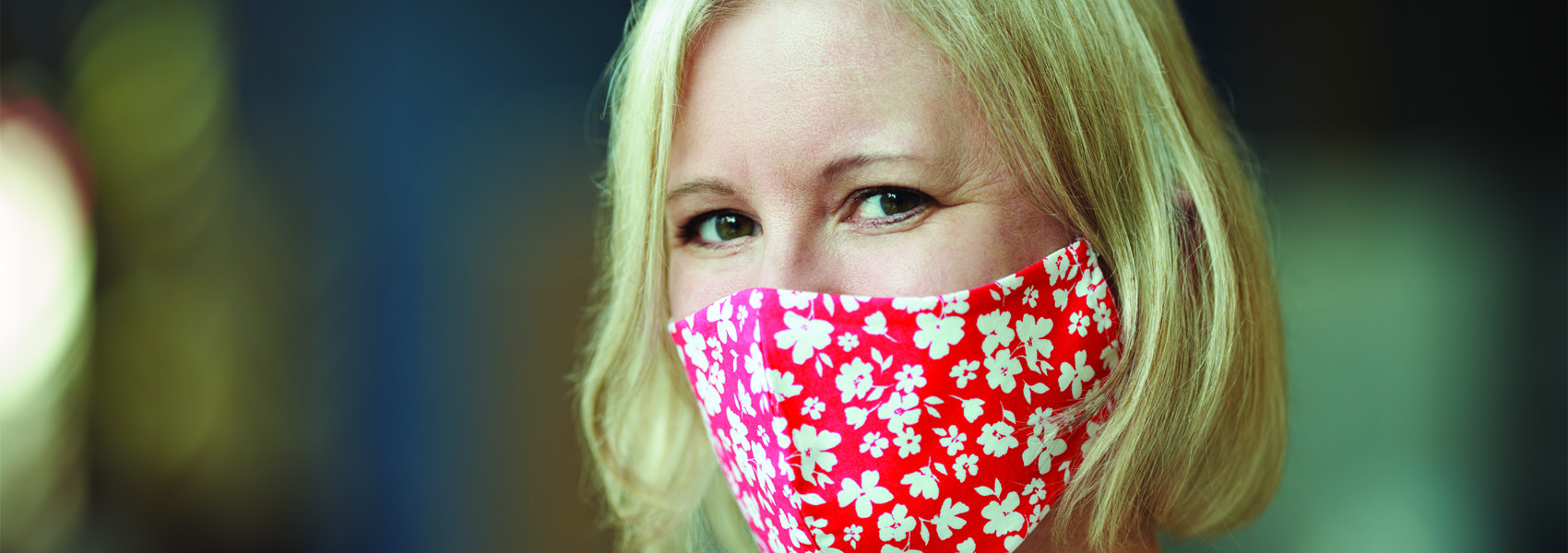



As a leading expert on the spread and transmission of Covid-19, Prof Cath Noakes OBE has the attention of the highest level of UK government.
Above: Prof Cath Noakes OBE was the main scientific consultant behind the messaging of the Hands Face Space campaign.
In April 2020, Covid-19 had not long pushed the UK into full lockdown when Prof Cath Noakes (Mathematical Engineering 1996; PhD Mechanical Engineering 2001) received an email. “It came out of the blue and it was a little unnerving,” she said. The email, from the Scientific Advisory Group for Emergencies (SAGE), requested her expertise on disease transmission to aid NHS and UK government decision-makers during the pandemic.
“While all these people were making sourdough bread, I didn’t have time to bake anything,” she joked. Instead, Cath gathered papers about transmission of the virus and started forming and leading the Environmental Modelling Group (EMG) – a sub-group of SAGE comprising engineers, architects, clinicians, modellers, microbiologists, behavioural scientists and public health specialists.
Cath was recruited by SAGE for her expertise in using physics and computer simulations to model how pathogens spread in buildings. As Professor of Environmental Engineering for Buildings in the School of Civil Engineering and Deputy Director of the Leeds Institute for Fluid Dynamics, Cath’s research includes investigating how touching contaminated surfaces can spread infections and how airborne diseases can be curtailed using air flow and ventilation.
“Until the start of the pandemic it was quite a niche area with a lot more focus on the energy consumption of a building,” she explained. “There’s nothing like going from obscurity to one of the most important topics there is.”
Central to her work is fluid dynamics – essentially how fluids such as liquids and air move. “How an aerosol is created in the respiratory system, what happens when someone breathes out, where the aerosol goes, how ventilation carries it to be inhaled by somebody else – that’s all fluid dynamics,” said Cath.
Along with other research, Cath leads a project called Hospital Environment Control, Optimisation and Infection Risk Assessment (HECOIRA), which is developing computational models to predict Covid-19 transmission in healthcare settings. Meanwhile, last July, she joined 35 international collaborators to pen an open letter, signed by 239 scientists worldwide, which urged decision-makers to recognise the potential for the airborne spread of Covid-19.
Through the EMG (whose membership includes another Leeds professor, Mark Wilcox) Cath has shaped public policy by delivering guidance to the NHS and the government. The group’s counsel has underpinned decisions on social distancing, reopening after lockdown and the assessment of risks for activities as diverse as dentistry, circuses, saunas and singing in groups. Cath was the main scientific consultant behind the messaging of the Hands Face Space campaign in September 2020, which was designed to promote awareness of how to reduce the virus’s spread.
Her contributions have not gone unnoticed. In August, she was recognised by The Royal Academy of Engineering with a President’s Special Award for Pandemic Service. Then, a month later, Cath received another unexpected email.
“My husband had previously said, ‘Oh, somebody will probably give you an OBE at some point’, and then I opened this email and saw I had been given one in the Queen’s Birthday Honours for ‘services to the Covid-19 response’,” Cath recalled. “It was an odd feeling because we were still in the middle of it all. It was nice to be recognised but it should be a shared award, really, for all the people at Leeds and all the others on SAGE who have worked very, very hard.”
Despite vaccines now in circulation, Cath’s advisory role will continue. “I think there’s now much more of an awareness that the built environment has big implications for how disease transmits, and that’s in all buildings – offices, schools and homes,” she said. Cath sees an imperative for further research into this link. “We still need to understand how much it matters but there’s nothing like a crisis to bring scientists together.”
Words
James Urquhart (History & Philosophy of Science and Biology 2003) is a science journalist and filmmaker.
Medicine: Prof Mark Wilcox co-chairs the Hospital Onset Covid-19 Working Group and also the UK Technical Validation Group, which is responsible for determining the accuracy of Covid-19 tests. He joins Cath Noakes on the Environmental Modelling Group.
Civil Engineering: Prof Barbara Evans (Civil Engineering 1987) is on an international team reviewing the links between Covid-19 and Water, Sanitation and Hygiene (WASH). She has been rolling out a training programme for public health staff with the government of India.
Earth and Environment: Prof Dave Hodgeson and Dr Gareth Keevil (PhD Earth and Environment 2005) used thermal imaging to study the air flow of people breathing through different face masks and air movements produced by singing or playing musical instruments.
Law: Prof Iyola Solanke is a member of the Independent Scientific Pandemic Insights Group on Behaviours, which advises SAGE on behavioural science aimed at anticipating and helping people adhere to interventions.
Mechanical Engineering: Prof Nikil Kapur (PhD Mechanical Engineering 1999) and Dr Pete Culmer (MEng Mechatronics 2002; PhD Mechanical Engineering 2007) converted unused sleep apnoea machines into ventilators.